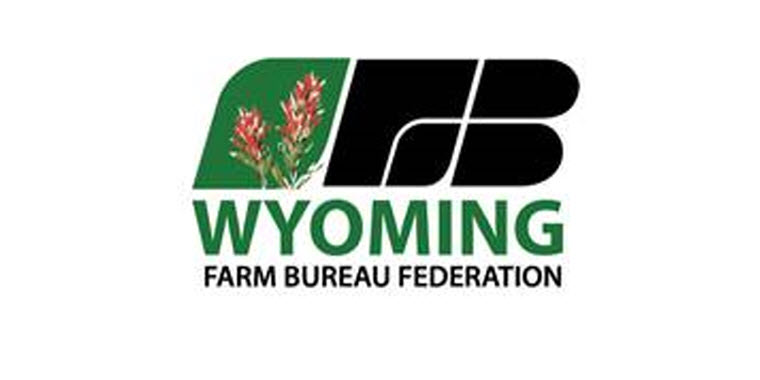LARAMIE—Dissolution of special districts, penalties for wanton destruction of livestock, trespassing for shed antler hunters, and speed limiting devices were among the many topics included in policies adopted at the 97th annual meeting of the Wyoming Farm Bureau Federation (WyFB). Held Nov. 10-12, 2016 in Laramie, Wyo., the meeting is an important step in the grassroots policy development process of Farm Bureau.
“The Farm Bureau grassroots policy development process ensures that our policy begins at the local level,” WyFB Executive Vice President Ken Hamilton explained. “By the time a resolution enters the policy book it has been reviewed by members at three different levels; county, district and state.”
Farm Bureau members approved policy opposing additional dissolution authority for special tax districts in Wyoming. “Our members expressed concern about potential legislation that would give county commissioners additional authority to initiate the process to dissolve a special district,” Hamilton said. “While we recognize there needs to be a mechanism for dissolving special districts, we also have to recognize in many instances there are laws on the books that will already help facilitate this process.”
“Many of these special districts were created to accomplish different public purposes and our members feel it would be important that the members of those districts have a say,” he continued.
According to Brett Moline, WyFB Director of Public and Government Affairs, Wyoming law allows for 28 different types of special districts and there are over 650 special districts within the state.
Concern with increasing incidences where people have shot and killed livestock in Wyoming and other states, members passed policy related to the wanton destruction of livestock. “Voting delegates felt the penalty should be substantial enough to deter future actions,” Hamilton explained. “The policy asks for legislation that anyone found guilty of wanton destruction of livestock would have to pay a fine four times the value of the animal as restitution to the animal’s owner.”
Protecting private property rights are at the forefront of the Federation’s work. Concern with increased incidences of shed antler hunters trespassing on private lands led to policy supporting the expansion of Game and Fish statutes to include collecting shed antlers in the trespass authority of the hunting and fishing regulations.
“This authority would make it so people gathering shed antlers on private property without the landowner’s consent could be charged with trespass similar to hunting trespass,” Hamilton explained. “Under current Game and Fish Statutes, the hunting trespass law provides that it is presumptive knowledge the individual that is hunting should know where they are at while hunting which makes fining them for trespass easier. The same should be true for trespass while collecting shed antlers.”
In other issues related to the Game and Fish Department, policy was passed asking that the Game and Fish Commissioners continue to be appointed by the Governor.
On the national level, voting delegates believe the Land and Water Conservation Fund should not receive funding. If it receives funding, the policy continues by asking that federal land acquisition not be allowed. “We need less, not more, of federal land ownership,” Hamilton stated.
WyFB members adopted policy opposing the federal government’s efforts to create a dual speed limit in Wyoming; one for commercial vehicles and one for non-commercial vehicles. Policy also passed opposing speed limiting devices in commercial vehicles. “Requiring commercial trucks to travel slower than other vehicles on the roadway could increase traffic hazard on the roads,” Hamilton said.
“These policies will be added to our policy book to help guide the federation in the work we do to protect private property rights,” Hamilton concluded.
Leaders elected
Todd Fornstrom, of Laramie County, was elected to his first term as WyFB President the organization’s 97th annual meeting in Laramie. Fornstrom succeeds Crook County Rancher Perry Livingston who served eleven terms as president of the Federation.
He and his wife, Laura, have four children and farm in Laramie County. The diversified farm consists of irrigated corn, wheat, alfalfa, dry beans and a cattle and sheep feedlot. They also run a trucking business, custom harvest and Todd is in a partnership and runs Premium Hay Products, an alfalfa pellet mill.
Voting delegates elected Cole Coxbill, of Goshen County, to his first term as WyFB Vice President. Coxbill and his wife, Sammie, have three children. They run a trucking business, commercial spraying business and raise cattle.
Byron Yeik, of Veteran, was elected to his first term as the Director-At-Large. Byron and his wife, Debb, run a diversified family farm/feedlot in Goshen County raising cattle, corn and alfalfa.
In addition to the three statewide elected positions, five district directors and the Young Farmer & Rancher state chair serve on the state board. The Young Farmer & Rancher Committee elected Stacy Berger to her first term as the state committee chair. From Albany County, Stacy and her husband Kyle, along with their four children, work on her family’s ranch.
The Wyoming Farm Bureau Federation is the state’s largest general agriculture organization. Policy development is grassroots beginning at the local level where members discuss issues impacting them. Resolutions that pass locally proceed to the district and then the state. Those resolutions with national impact proceed to the national convention. The primary goals of the organization are to protect private property rights and help members achieve an equitable return on their investment. On the web, www.wyfb.org.


